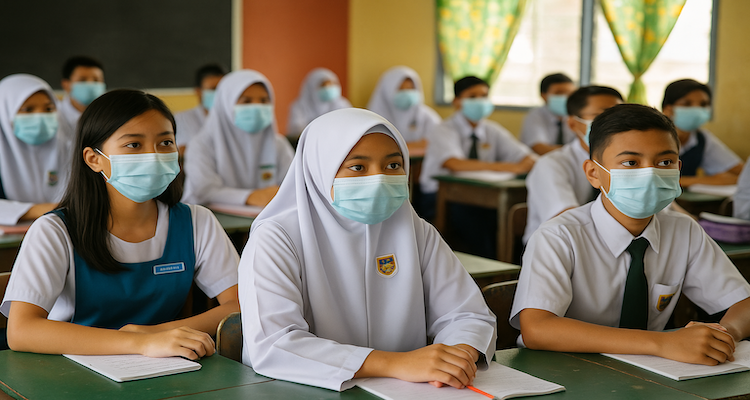Malaysia Battles Influenza Surge: Schools Shut as 6,000 Students Fall ill

Malaysia faces a sharp rise in influenza cases, with 6,000 students infected and schools temporarily closed as authorities implement COVID-era precautions.
A sudden wave of influenza infections is sweeping through Malaysia, leaving nearly 6,000 students ill and prompting the closure of several schools. The government has launched emergency measures to contain the outbreak and safeguard public health just as memories of the COVID-19 pandemic linger in the national consciousness.
Context & Background
The influenza surge comes at a sensitive time when the education system is regaining full stability after years of pandemic-related disruptions. Health officials have noted that the current strain is spreading swiftly among school-aged children, with classrooms and kindergartens becoming key transmission hubs.
According to the Health Ministry, 97 influenza clusters have been identified nationwide an alarming rise from just 14 clusters the week prior. Most of these cases have been traced to schools and early childhood centers, raising concerns among parents and educators alike.
Main Developments
On Monday, Education Ministry Director General Mohd Azam Ahmad confirmed the scale of the outbreak, stating that around 6,000 students have tested positive for influenza in various regions of Malaysia. While he did not specify the number of schools forced to close, he emphasized that precautionary closures were implemented to prevent further spread among students and staff.
The Ministry has since issued renewed health advisories, instructing schools to reinforce hygiene practices, minimize large group activities, and encourage mask-wearing echoing the containment methods familiar from the COVID-19 era.
Expert Insight
Addressing the public through a local news broadcast, Mohd Azam stressed that the nation’s experience with infectious disease management remains a vital asset.
“We already have extensive experience in managing infectious diseases since COVID-19,” he said. “Schools have been reminded to follow strict preventive measures, including encouraging the use of masks and limiting mass gatherings among students.”
Health experts warn that such outbreaks, though cyclical, could intensify in humid, densely populated areas where children spend extended hours in close proximity. They have advised families to ensure that children displaying flu-like symptoms stay home and seek medical care early.
Impact & Implications
The outbreak has reignited public anxiety about the vulnerability of Malaysia’s school system to seasonal illnesses. Parents have taken to social media expressing concern over the return of face masks in classrooms, while educators balance maintaining learning continuity with safety obligations.
Health officials believe that with timely interventions and public cooperation, the situation can be stabilized within weeks. However, the spike in reported clusters underscores the importance of vaccination, proper ventilation in schools, and consistent health monitoring to prevent future disruptions.
From a broader perspective, this incident may prompt a review of Malaysia’s school health protocols, ensuring they remain adaptive to evolving public health challenges in the post-pandemic world.
As Malaysia works to curb the growing influenza wave, authorities are urging calm and vigilance. The nation’s swift response drawing lessons from COVID-19 reflects both preparedness and resilience. Whether this outbreak marks an isolated flare-up or signals a more persistent health challenge will depend on how effectively containment measures are upheld in the weeks ahead.
(Disclaimer: This article is based on official statements and verified reports from Malaysian health and education authorities. Information provided reflects the latest available data at the time of publication.)
ALSO READ: Guidelines on Human T-Cell Lymphotropic Virus-1 (HTLV-1) Prevention and Testing










